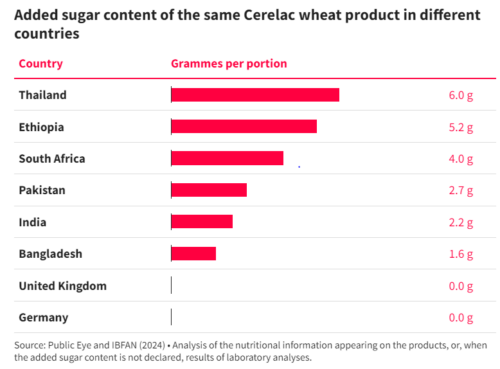Weekend reading: report on sugar content of Nestlé’s baby food products—by country
An investigative report from Public Eye and the International Baby Food Action Network (IBFAN): “How Nestlé gets children hooked on sugar in lower-income countries.”
Nestlé’s leading baby-food brands, promoted in low- and middle-income countries as healthy and key to supporting young children’s development, contain high levels of added sugar. In Switzerland, where Nestlé is headquartered, such products are sold with no added sugar. These are the main findings of a new investigation by Public Eye and the International Baby Food Action Network (IBFAN), which shed light on Nestlé’s hypocrisy and the deceptive marketing strategies deployed by the Swiss food giant.
The report points out that Nestlé (no relation) “currently controls 20 percent of the baby-food market, valued at nearly $70 billion.”
Nestlé promotes Cerelac and Nido as brands whose aim is to help children “live healthier lives”. Fortified with vitamins, minerals and other micronutrients, these products are, according to the multinational, tailored to the needs of babies and young children and help to strengthen their growth, immune system and cognitive development….
Spoiler alert: Our investigation shows that, for Nestlé, not all babies are equal when it comes to added sugar. While in Switzerland, where the company is headquartered, the main infant cereals and formula brands sold by the multinational come without added sugar, most Cerelac and Nido products marketed in lower-income countries do contain added sugar, often at high levels.
For example, in Switzerland, Nestlé promotes its biscuit-flavoured cereals for babies aged from six months with the claim “no added sugar”, while in Senegal and South Africa, Cerelac cereals with the same flavour contain 6 grams of added sugar per serving….
Similarly, in Germany, France and the UK – Nestlé’s main European markets – all formulas for young children aged 12-36 months sold by the company contain no added sugar. And while some infant cereals for young children over one year old contain added sugar, cereals for babies aged six months do not.
Do small amounts of sugar like these make any difference to babies’ health? After all, 6 gram is just a bit more than a teaspoon.
They might make a big difference:
- They get kids hooked on sugars.
- The sugars can add up quickly.
For sure, this report shows is that sugar is not really necessary. It is there to encourage sales, not health.
The report is getting international publicity:


